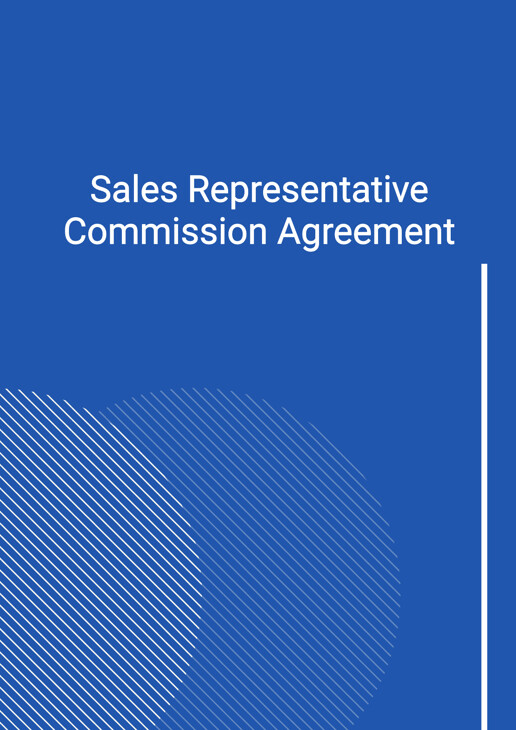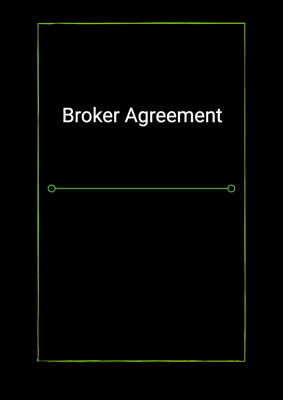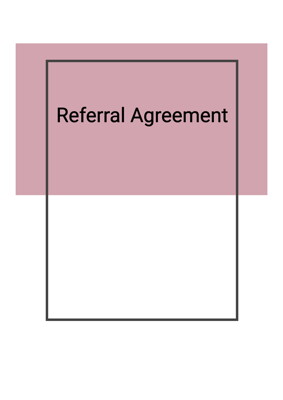How to Tailor the Document for Your Need?
01
Create Document
Fill in the details of the parties. You can click the "Fill with Member’s Information" button to complete it with information saved to your account.
02
Fill Information
Please fill in any additional information by following the step-by-step guide on the left hand side of the preview document and click the "Next" button.
03
Get Document
When you are done, click the "Get Document" button and you can download the document in Word or PDF format.
04
Review Document
Please get all parties to review the document carefully and make any final modifications to ensure that the details are correct before signing the document.
Document Preview
Document Description
The Sales Representative Commission Agreement is a document that outlines the terms and conditions between a company and a salesperson. It is important because it establishes the relationship between the two parties and defines their rights and obligations. The agreement begins with a detailed introduction, stating the names and addresses of the company and the salesperson. It also specifies that the agreement will remain in effect unless terminated according to the provisions outlined.
The document is divided into several sections, each addressing different aspects of the agreement. The first section, titled 'Sales Scope,' outlines the products that the salesperson will be selling on behalf of the company. It emphasizes that the salesperson must adhere to certain parameters and obtain written approval from the company before using any promotional materials. It also mentions that the price of the products will be determined by the company and that a sales agreement template will be provided for all sales. Additionally, if applicable, the document includes a section on the territory in which the salesperson is authorized to sell the products.
The second section, titled 'Remuneration of Salesperson,' details the commission structure for the salesperson. It specifies that the salesperson will receive a commission for each successful sale made, based on a percentage of the contract price. The agreement defines various terms related to commission payment, such as the length of time for which the commission will be payable and the definition of a successful sale. It also clarifies that the commission will only be paid if the contract price is received in full from the client.
The third section, titled 'Obligations of Salesperson,' outlines the responsibilities of the salesperson. It states that the salesperson must diligently work to secure business for the company and must not make any commitments on behalf of the company without prior written consent. The section also prohibits the salesperson from entering into legal agreements with clients on behalf of the company and from carrying additional competing product lines without the company's consent. It emphasizes the importance of maintaining the confidentiality of the company's business secrets.
The fourth section, titled 'Termination of Agreement,' explains the conditions under which either party can terminate the agreement. It states that either party can terminate the agreement by providing written notice at least three days before the intended termination date. It also specifies that certain clauses, such as the obligations of the salesperson and the non-compete clause, will survive the termination of the agreement. The section further clarifies that the salesperson will receive a commission on successful sales made before the termination date.
The fifth section, titled 'Non-Compete,' restricts the salesperson from selling any competing products for a period of one year after the termination of the agreement. This clause aims to protect the company's business interests.
The sixth section, titled 'Miscellaneous,' includes various additional provisions. It states that the salesperson will serve as an independent contractor and not as an employee of the company. It also specifies that any notices under the agreement should be made in writing or by email. The section further clarifies that the agreement constitutes the entire agreement between the parties and that any alterations or variations must be made in writing and signed by both parties. It also includes provisions regarding the governing laws and jurisdiction.
In conclusion, the Sales Representative Commission Agreement is a comprehensive document that covers all aspects of the relationship between a company and a salesperson. It outlines the sales scope, remuneration, obligations, termination, non-compete, and miscellaneous provisions. By clearly defining the rights and responsibilities of both parties, the agreement helps ensure a mutually beneficial and legally binding relationship.
How to use this document?
1. Enter the names and addresses of the company and the salesperson in the agreement to clearly identify both parties.
2. Specify the products that the salesperson will be selling on behalf of the company. Ensure that the salesperson understands and agrees to abide by the scope and parameters outlined.
3. If applicable, define the territory in which the salesperson is authorized to sell the products. Restrict the salesperson from selling outside of the defined territory.
4. Determine the commission structure for the salesperson. Specify the percentage of the contract price that will be paid as commission for each successful sale. Clarify the terms related to commission payment, such as the length of time for which the commission will be payable.
5. Outline the obligations of the salesperson, including the requirement to diligently work to secure business for the company. Prohibit the salesperson from making commitments on behalf of the company without prior written consent.
6. Emphasize the importance of maintaining the confidentiality of the company's business secrets. Prohibit the salesperson from disclosing or using any confidential information without the company's consent.
7. Include provisions for the termination of the agreement. Specify the conditions under which either party can terminate the agreement and the consequences of termination.
8. Restrict the salesperson from selling any competing products for a specified period after the termination of the agreement. Protect the company's business interests.
9. Clarify that the salesperson will serve as an independent contractor and not as an employee of the company. Specify the salesperson's responsibilities regarding taxes and expenses.
10. Ensure that any notices under the agreement are made in writing or by email. Provide the contact information of each party for communication and the delivery of notices.
11. Include a provision stating that no failure or delay in exercising any right or remedy under the agreement shall constitute a waiver of such right or remedy.
12. Specify that the agreement constitutes the entire agreement between the parties and that any alterations or variations must be made in writing and signed by both parties.
13. Determine the governing laws and jurisdiction applicable to the agreement.
Note: This guidance provides a general overview of the steps to use the document. It is important to consult with legal professionals to ensure compliance with relevant laws and regulations.




















